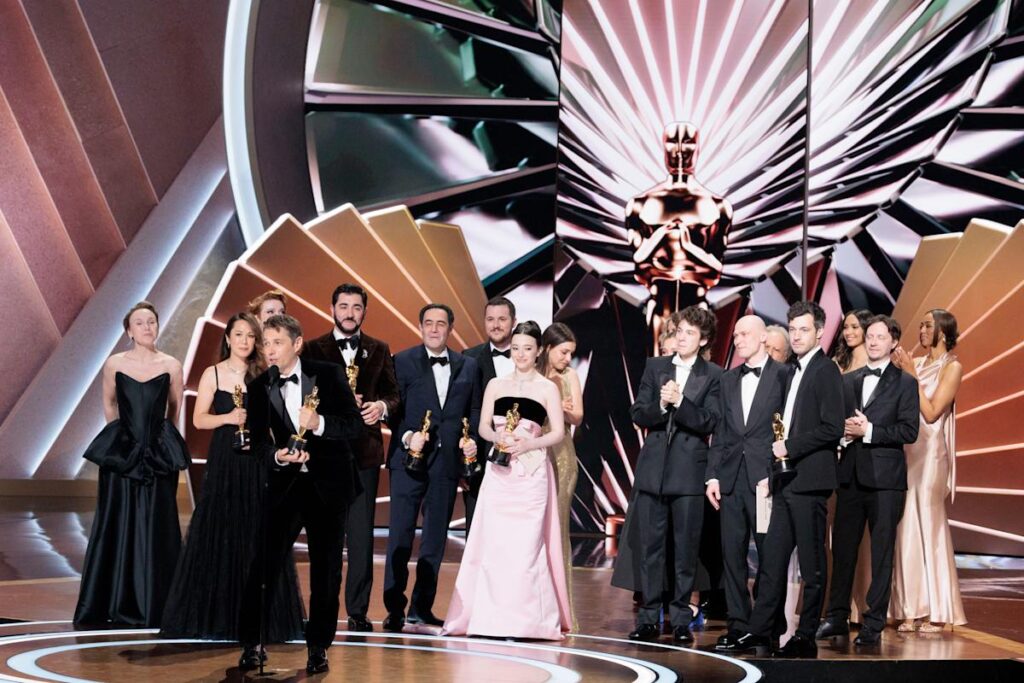
Generative AI Oscar Nominations: Academy Takes Neutral Stance on AI Use
Generative AI Oscar Nominations: Academy Takes Neutral Stance on Technology Use
The Academy of Motion Picture Arts and Sciences has officially addressed the impact of generative AI Oscar nominations in a statement outlining changes to the voting process for the 98th Academy Awards. The Academy has decided to take a neutral stance on AI use in filmmaking, declaring that utilizing generative AI “will neither help nor harm the chances of achieving” Oscar nominations. This decision comes at a pivotal moment for the film industry as AI technology becomes increasingly prevalent in production processes.
The Academy of Motion Picture Arts and Sciences has announced its official stance on generative AI use in Oscar-eligible films. (Photo: AMPAS)
Table of Contents
Academy’s Official Stance on AI in Filmmaking
The declaration regarding generative AI Oscar nominations represents the Academy’s first formal position on a technology that has rapidly transformed creative industries. According to a statement released by the organization, the use of generative artificial intelligence and other digital tools in filmmaking will be evaluated neutrally during the nomination process. This means that films utilizing AI technology will face neither advantages nor disadvantages when being considered for prestigious Academy Awards.
“With regard to Generative Artificial Intelligence and other digital tools used in the making of the film, the tools neither help nor harm the chances of achieving a nomination,” AMPAS writes. “The Academy and each branch will judge the achievement, taking into account the degree to which a human was at the heart of the creative authorship when choosing which movie to award.”
This stance on generative AI Oscar nominations indicates that the Academy is attempting to navigate a middle path as the industry grapples with rapidly evolving technology. Rather than establishing strict guidelines prohibiting AI use or actively encouraging technological innovation, the organization has opted for a case-by-case evaluation approach focused on human creative contribution.
Recent AI Controversies in Award-Nominated Films
The debate surrounding generative AI Oscar nominations first gained significant attention during the 2024 awards season when two Best Picture nominees acknowledged using AI technology in their productions. The Brutalist and Emilia Pérez both admitted to employing AI tools to modify vocal performances, raising questions about authenticity and creative authorship in film.
These high-profile cases brought the issue of generative AI Oscar nominations to the forefront of industry discussions. The controversy centered on whether films using AI-enhanced performances should be eligible for the same recognition as those created entirely through traditional human performance and craftsmanship. The Academy’s new statement appears to be a direct response to these questions that emerged during the previous awards cycle.
Notable Films Using AI Technology
- The Brutalist – Used AI to modify certain vocal performances
- Emilia Pérez – Employed voice cloning technology for specific scenes
- Both films were nominated for Best Picture despite AI use controversies
- Their nominations sparked industry-wide debate about generative AI Oscar nominations criteria
Human Creativity Remains Central to Evaluation
While taking a neutral position on generative AI Oscar nominations, the Academy emphasized that human creativity remains the primary consideration in their evaluation process. The statement specifically mentions that judges will assess “the degree to which a human was at the heart of the creative authorship” when determining which films to honor.
This qualification suggests that while the Academy won’t automatically penalize films for incorporating AI tools, productions that rely too heavily on automated processes at the expense of human artistry might face challenges in the nomination process. The statement establishes a balance that acknowledges technological innovation while reaffirming the Academy’s traditional values centered on human artistic achievement.
For filmmakers concerned about how generative AI Oscar nominations might affect their projects, this guidance provides some clarity while maintaining flexibility as the technology continues to evolve. The emphasis on human creativity creates a framework that can adapt to future technological developments without requiring frequent policy revisions.
Hollywood Union Concerns About AI
The Academy’s neutral stance on generative AI Oscar nominations contrasts with the more cautious positions taken by major Hollywood labor unions. AI usage was a central issue during the 2023 strikes by both the Writers Guild of America (WGA) and Screen Actors Guild-American Federation of Television and Radio Artists (SAG-AFTRA).
These unions have expressed significant concerns about AI potentially replacing human creative work. While the current applications of AI in nominated films like The Brutalist and Emilia Pérez focused on modifying existing performances rather than replacing actors entirely, union representatives worry about more extensive AI implementation in future productions.
Union Positions on AI in Filmmaking
- WGA secured protections against AI-generated content replacing writer contributions
- SAG-AFTRA negotiated consent requirements for AI replications of actors
- Both unions view AI as potentially threatening jobs and creative control
- The Academy’s neutral stance on generative AI Oscar nominations doesn’t address these labor concerns
This discrepancy between the Academy’s approach to generative AI Oscar nominations and union stances highlights the complex landscape the film industry must navigate. While the Academy focuses primarily on the final artistic product and its quality, unions must prioritize protecting their members’ employment and rights in an evolving technological environment.
Future Implications for AI in Award-Eligible Films
The Academy’s position on generative AI Oscar nominations likely represents just the beginning of an ongoing conversation that will evolve alongside the technology. As generative AI capabilities advance, filmmakers may find increasingly sophisticated ways to incorporate these tools into the creative process.
Industry observers note that while current AI use in award-nominated films has been relatively limited, future productions could potentially employ the technology in more substantial ways. This could include generating visual effects, creating background elements, or even producing entire scenes. The Academy’s current framework for evaluating generative AI Oscar nominations will be tested as these applications become more common.
Some experts suggest that the film industry is waiting for decisive legal rulings regarding AI copyright issues before establishing more definitive policies. Several ongoing lawsuits against AI companies could significantly impact how creative industries approach these technologies. Until such legal precedents are established, the Academy’s neutral stance on generative AI Oscar nominations provides a flexible approach during this period of technological and legal uncertainty.
Evolving Academy Policies
The Academy has shown increasing flexibility in recent years by:
- Expanding membership to include more diverse voices
- Adding new award categories like the recently announced Stunt Design Award
- Improving the voting process for greater transparency
- Establishing this neutral position on generative AI Oscar nominations
These changes suggest the organization will continue adapting its approach to AI as the technology and its applications evolve.
As filmmakers experiment with new creative possibilities enabled by AI, the conversation around generative AI Oscar nominations will undoubtedly continue. The Academy’s current position offers a framework that acknowledges the presence of these tools in modern filmmaking while emphasizing that technology alone cannot replace the human creativity at the heart of cinematic excellence.
For now, filmmakers can proceed with the knowledge that AI use itself won’t disqualify their work from award consideration, though the Academy will continue evaluating how these tools impact the fundamental human artistry that has always been central to the Oscar recognition process.
Published on April 21, 2025





